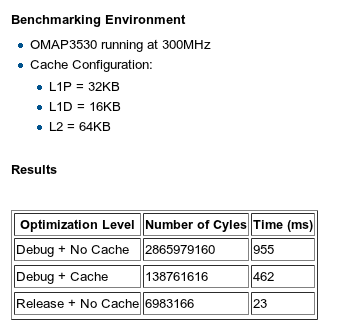Hi,
I wonder if someone can guide me in memory management on 6670.
I want to try Use of a shared message buffer for large array allocated from DDR, section 6.3 of http://www.ti.com/lit/an/sprab27a/sprab27a.pdf mentioning use of formula
<base address> + <per-core-area size> × DNUM
Let say I have following code and I want to run same code on all cores, but all cores have different parts of array.
#pragma(A,".mydata") //mydata is allocated from DDR
int A[1000];
when each core runs above code they will have length of 250 on each.
I would appreciate if someone give an example of allocating array?
Thanks,
/F


